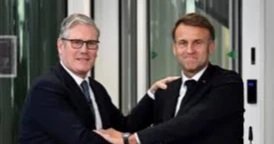UK, France, Germany urge Israel to open Gaza to aid after Macron backs Palestinian statehood

The leaders of the UK, France, and Germany have jointly pressed Israel to allow full humanitarian access to Gaza, warning of a worsening crisis, shortly after French President Emmanuel Macron announced France will formally recognize a Palestinian state — the first major Western nation to do so.
The joint statement followed a phone call between Macron, British Prime Minister Keir Starmer, and German Chancellor Friedrich Merz. In it, the three leaders called for an immediate ceasefire and condemned the denial of vital humanitarian aid to Gaza’s civilians, though the statement did not introduce any new policy measures.
The leaders affirmed their readiness to support further steps toward a ceasefire and a long-term political solution, but did not outline specific actions.
Macron’s move to recognize Palestinian statehood exposed policy rifts among the so-called E3 nations (France, Germany, and the UK), who all theoretically support a two-state solution but differ in timing and approach.
Germany clarified it has no immediate intention to follow France’s lead, stating that official recognition should come at the end of a negotiated peace process. Britain also hasn’t adopted France’s position but is facing rising pressure to do so — not only from opposition politicians but also from figures within Starmer’s own Labour government.
Health Secretary Wes Streeting called for immediate recognition, warning that time is running out to recognize a Palestinian state that still exists. On Friday, 221 members of the UK Parliament signed a letter urging Starmer to take action.
“For decades we’ve endorsed a two-state solution. Recognizing Palestine now would give real weight to that commitment,” the letter said, signed by lawmakers from across the political spectrum.
In remarks after the E3 call, Starmer criticized several aspects of the conflict, including the ongoing detention of hostages, the humanitarian crisis in Gaza, rising settler violence, and Israel’s disproportionate military campaign.
He reiterated his support for Palestinian statehood but stressed it must be part of a broader, credible peace process.
“I am clear that recognition must be part of the journey toward a two-state solution and lasting peace,” he said.
Over 140 countries already recognize Palestine as a state, including several in Europe. France is the first among the G7 nations — and the largest European country — to take this step.
The decision was met with criticism from Israel and the United States.
While the UK has consistently backed the concept of an independent Palestinian state alongside Israel, it has maintained that formal recognition should occur only through negotiated peace talks — something that seems far from reach. There has been no serious Israeli-Palestinian dialogue for years, even before the Hamas-led October 7, 2023 attacks, which killed 1,200 people and triggered the current war.
The dire humanitarian conditions in Gaza — where starvation is increasing and children are dying from hunger — have deeply unsettled even Israel’s strongest European allies.
Germany, historically one of Israel’s most steadfast backers due to the legacy of the Holocaust, emphasized that statehood recognition should come at the end of a peace agreement. Still, Berlin has taken a firmer tone, calling Israeli military actions in Gaza unacceptable and demanding more humanitarian access.
On Friday, the German government said it remains in ongoing discussions with Israel and other partners about a ceasefire and better aid delivery. While stating it is willing to “increase pressure” if needed, it offered no details.
Britain has already suspended some arms exports to Israel, paused free trade negotiations, and imposed sanctions on far-right Israeli ministers and extremist settlers. Nonetheless, Starmer continues to face calls to adopt tougher measures.
Complicating his position is his desire to maintain a strong relationship with the United States, whose administration has criticized Macron’s decision. Starmer is set to meet President Donald Trump during Trump’s visit to Scotland, where he owns two golf resorts.
Yossi Mekelberg, a Middle East analyst at Chatham House, noted that Macron delaying formal recognition until September may give other countries time to align with France.
“The UK is getting close, but it’s not there yet,” Mekelberg said. “Macron’s timing might give Starmer room to move, even if he’s naturally cautious. This could generate momentum for the UK to follow.”



